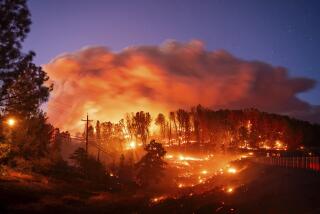Arson Jury Told to Weigh Facts, Not Past Crimes
- Share via
Defense lawyers for convicted arsonist and former Glendale Fire Capt. John Leonard Orr told jurors Wednesday not to judge their client on his previous crimes but focus instead on testimony by expert witnesses who concluded that a fatal South Pasadena hardware store blaze was the result of an electrical malfunction.
Defense attorney Edward Rucker told jurors that four experts from the state fire marshal’s office, the Los Angeles County Sheriff’s Department, Los Angeles Fire Department and an insurance company found no arson in the 1984 fire that killed four people at Ole’s Home Center.
“These were all arson experts who were called to the scene as law enforcement officers or by insurance companies looking for arson,” Rucker told the six-man, six-woman jury. “How many of these men would lie for John Orr?”
Orr, 49, currently is serving a 30-year federal prison term after being convicted in 1992 of setting a series of hardware store blazes in the San Joaquin Valley. A year later, he pleaded guilty to torching three other businesses in Atascadero and North Hollywood.
The once nationally known arson expert is charged with four counts of murder stemming from the Ole’s blaze, which killed two employees and a 50-year-old woman and her 2-year-old grandson. Those charges carry a possible death sentence.
Orr also has been charged with 21 counts of arson in connection with fires in the San Fernando and San Gabriel valleys earlier this decade, including a 1991 blaze in Burbank that destroyed the set of the television show “The Waltons,” as well as the College Hills firestorm in Glendale that burned down 67 homes.
Deputy Dist. Atty. Michael Cabral this week attempted to undermine the credibility of the arson experts, saying their opinions were based on a report by a former Los Angeles County Sheriff’s Department arson investigator, who Cabral said took just an hour and a half to declare the Ole’s fire was begun by an electrical problem.
Cabral and co-prosecutor Sandra Flannery contend that Orr engaged in a distinctive pattern of behavior that included arriving early at fires, displaying an inside knowledge of their cause, staking out locations to set fires and concealing or deceiving colleagues or law enforcement officials about what he knew.
Defense attorneys said the evidence and testimony left room for a different interpretation.
Focusing primarily on the Ole’s fire, Rucker argued there were problems with lighting, a store phone and the fire-alarm system, suggesting that a smoldering attic fire burned the wiring to those devices.
“If there are two reasonable interpretations of the fire, you must follow the interpretation that points to innocence,” Rucker said. “Electrical fires are the most common cause of fires in the United States.”
Contrary to the prosecution’s contention that Orr used a time-delay incendiary device to set off the Ole’s fire, Rucker said his client was probably in a bar, “having a beer,” on “a World Series Night,” when he was paged to come to another fire in Pasadena at 7:45 p.m.
Given the drive and time he spent consulting with a Pasadena arson investigator, Orr could not have been at Ole’s when the fire broke out a little after 8 p.m., Rucker said.
The defense is expected to complete its closing arguments in the five-week trial today as attorney Peter Giannini addresses the other arson fires and counters allegations that Orr’s unpublished manuscript for a novel--about a firefighter turned fire bug--reflected his real life crimes.
More to Read
Sign up for Essential California
The most important California stories and recommendations in your inbox every morning.
You may occasionally receive promotional content from the Los Angeles Times.













